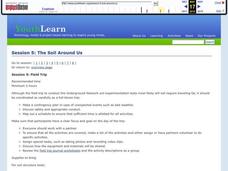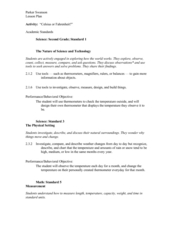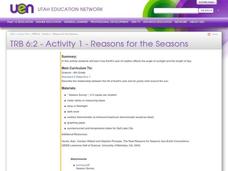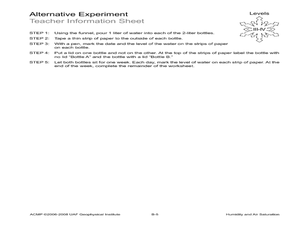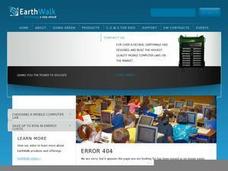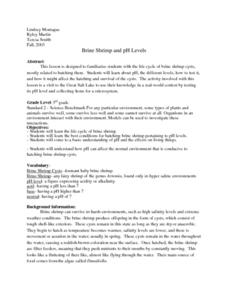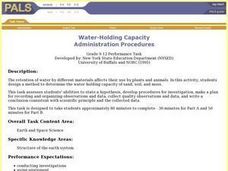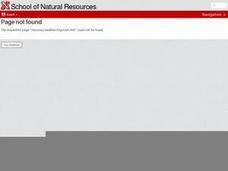Curated OER
Field Trip Preparation
Students make a contingency plan in case of unexpected events such as bad weather. They discuss safety and appropriate conduct.They map out a schedule to ensure that sufficient time is allotted for all activities.
Curated OER
Probability Of One Event
Students investigate the concept of probability. They use example problems in order to measure the likelihood of various outcomes. The lesson includes dialogue to be used by the teacher during direct instruction. They also use class...
Curated OER
This Lesson Is a Breeze, So Don't Blow It!
Students conduct an experiment to show that air is all around us and that wind is the movement of air. They construct a weather vane to determine which direction the wind is blowing.
Curated OER
Celsius or Fahrenheit?
Second graders create a thermometer. In this Celsius or Fahrenheit lesson plan, 2nd graders create an individual thermometer to use for measuring the temperature. Students convert the outside temperature.
Curated OER
Classification of Clouds
Students view a cloud slide show presentation and identify types of clouds. They estimate height based on cloud's appearance. They discuss the vague nature of cloud nomenclature and compare it to the English standard measurement system.
Curated OER
Precipitation Monitoring
Students monitor the pH level of the precipitation in their local area for one month. In this hands-on activity, students use lab equipment to measure the pH levels and an online tool to track their findings. Ultimately, students seek to...
Curated OER
Reasons for the Seasons
Sixth graders conduct and analyze a survey that explores public perceptions about the reasons for seasonal change. They measure the changing length of days, observe shadows and discuss how the Earth's axis of rotation affects the seasons.
Curated OER
Ecology: Factors Influencing Animal Populations
Young scholars assess the factors affecting animal populations. Working in groups they define specific vocabulary terms and complete several activities from "Project Wild."
Curated OER
Humidity and Air Saturation
Students experiment with air saturation. In this earth science lesson, students first complete an activity which teaches humidity. Then they use the scientific method to create their own experiments to test how long it takes a...
Curated OER
Chronic Conics
Fourth graders use two activities to draw four different conic sections. One activity is of a physical nature and one is traditional paper and pencil.
Curated OER
Arctic Microclimates
Students identify, measure, and average micro-climatic temperatures in a particular region. They draw a small-scale map of an area to be sampled (classroom, playground, park, backyard) and identify potential locations for...
Curated OER
Science: Suddenly Snow
Students engage in snow-related activities during the first winter snowfall. After explaining the elements needed for it to snow, they preserve snowflakes on frozen slides and observe them under a microscope. Then, they write diamante...
Curated OER
Brine Shrimp And Ph Levels
Third graders investigate the different ph levels found in water that is tested using simple measurements. The water samples are taken from a local body of water. The ph levels are used to help indicate areas where shrimp can thrive in...
Curated OER
Tracking Current "Earth" Events
Eighth graders utilize Internet research skills, and practice their communication skills by presenting their research to the clas. They actively consider the types of hazards for humans associated with Natural Disaters and ways that...
Curated OER
Water-Holding Capacity
Learners design and conduct an experiment to compare the water-holding capacity of sand, soil, and moss. They measure the change in weight for each material after adding the same amount of water to each material.
Curated OER
Using Newsprint as a UV Detector
Students investigate the effects of UV radiation. In this earth science lesson, students explain how the time of day relate to UV abundance on Earth. They determine if weather affects the amount of UV that Earth receives.
Curated OER
TE Lesson: Tsunami Attack!
Students examine how earthquakes, volcanoes, and landslides can trigger tsunami waves. They determine how engineers use sensors to detect the dangerous wave, and how they help design building that will survive the wave force and water.
Curated OER
Making Waves: A Study of Earthquakes and Tsunami
Students examine plate tectonics and the causative effect of earthquakes. In this tectonics instructional activity students differentiate between the types of energy waves that cause earthquakes and tsunamis and how waves travel at...
Curated OER
Using SWMP Data
Students are introduced to the SWMP system which tracks short-and long-term changes in water. Using this data, they plot and interpret the data on a graph to determine how human activities are lowering the water quality. They also...
Curated OER
Sizing Up Hail
Students participate in an estimation and measurement activity to improve their estimates of the size of hail. They hold several different sized wooden balls and record their guesses of the ball's diameters. They compare their estimates.
Curated OER
Classroom Triangles
Young scholars use bearing measurements to triangulate and determine objects' locations. Working in teams of two or three, students must put on their investigative hats as they take bearing measurements to specified landmarks in their...
Curated OER
The Big Crush
Students examine weather maps from their state from the past few days. They examine the Highs and Lows on the maps to determine what kind of weather they produce. They use that information to better prepare for their activities and what...
Curated OER
Make a Snowflake
Students study the design of snowflakes. In this snow lesson, students discover the different shapes of a snowflake, and their similarities. Students study snowflakes outside, then create their own with popsicle sticks...
Curated OER
Who Wants To Be A Fitnessaire? Closer
Students enjoy a review game to measure their knowledge about physical activity and the various components of fitness.


